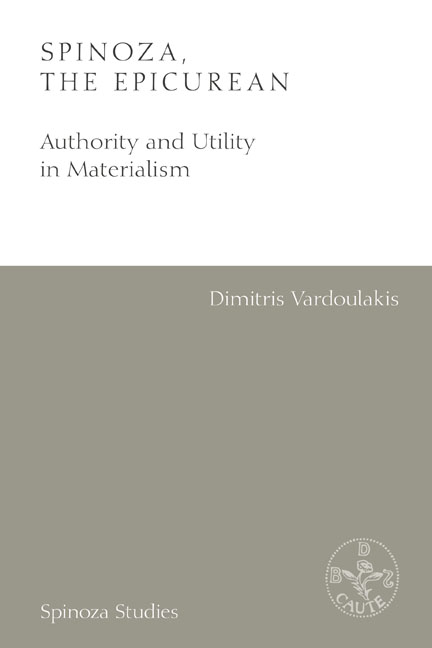Book contents
- Frontmatter
- Contents
- Reference Guide to Spinoza’s Work
- Acknowledgements
- Dedication
- Preamble
- Introduction: Why is Spinoza an Epicurean?
- 1 Freedom as Overcoming the Fear of Death: The Dialectic of Authority and Utility in the Preface
- 2 The Power of Error: Moses, the Prophets and the People (chapters 1, 2 and 3)
- 3 Philonomianism: Law and the Origin of Finitude (chapter 4)
- 4 Political Monism: The Primacy of Utility over Authority (chapters 5 and 6)
- 5 Love your Friend as Yourself: The Neighbour and the Politics of Biblical Hermeneutics (chapters 7 to 13)
- 6 The Freedom to Philosophize: The Two Paths to Virtue (chapters 14 and 15)
- 7 Fear and Power: Natural Right and Authorization in Spinoza and Hobbes (chapter 16)
- 8 Theocracy: On the State of Authority (chapters 17 and 18)
- 9 The Authority to Abrogate: The Two Paths to Virtue and the Internal Enemy (chapters 19 and 20)
- Conclusion: The Limitation of Spinoza’s Epicureanism
- Bibliography
- Index
9 - The Authority to Abrogate: The Two Paths to Virtue and the Internal Enemy (chapters 19 and 20)
Published online by Cambridge University Press: 20 October 2020
- Frontmatter
- Contents
- Reference Guide to Spinoza’s Work
- Acknowledgements
- Dedication
- Preamble
- Introduction: Why is Spinoza an Epicurean?
- 1 Freedom as Overcoming the Fear of Death: The Dialectic of Authority and Utility in the Preface
- 2 The Power of Error: Moses, the Prophets and the People (chapters 1, 2 and 3)
- 3 Philonomianism: Law and the Origin of Finitude (chapter 4)
- 4 Political Monism: The Primacy of Utility over Authority (chapters 5 and 6)
- 5 Love your Friend as Yourself: The Neighbour and the Politics of Biblical Hermeneutics (chapters 7 to 13)
- 6 The Freedom to Philosophize: The Two Paths to Virtue (chapters 14 and 15)
- 7 Fear and Power: Natural Right and Authorization in Spinoza and Hobbes (chapter 16)
- 8 Theocracy: On the State of Authority (chapters 17 and 18)
- 9 The Authority to Abrogate: The Two Paths to Virtue and the Internal Enemy (chapters 19 and 20)
- Conclusion: The Limitation of Spinoza’s Epicureanism
- Bibliography
- Index
Summary
Having presented the two regimes of power – natural democracy and the state of authority – following the two paths to the good – the path of rationality and the path of the emotions, respectively – we now find ourselves in a position to inquire about the relation between these two regimes and their co-articulation in two paths. Any answer to the question about the relation between the two paths needs to start from Spinoza's insistence in chapter 17 that neither path is pure. Thus, the opening sentence of the chapter refers back to the previous chapter, saying that the ‘picture presented in the last chapter … though it comes quite close to actual practice and can increasingly be realised in reality, must nevertheless remain in many respects no more than theory [in multis mere theoretica]’ (185/201). Later, immediately after defining the theocracy of the Hebrew state as the coincidence of civil and religious law, Spinoza observes that nonetheless this is ‘a matter of theory rather than fact [omnia opinione magis, quam re constabant]’ (189–90/206). Thus, both paths to communal virtue made available through the political application of the anthropological principle are, on their own, more theory than praxis. In actuality, neither can be realized in a pure form. Or, differently put, no state can be a pure democracy or a pure authority.
If the two paths are not pure, then they contaminate each other by veering into each other's paths. Each path is not the realization of its end, but a process in which the negotiation with the other path is critical. Thus, the path of reason that is characterized by the operation of right through the calculation of utility is constantly in complex relations with the path of the emotions relying on the imitation of the affects as well as on obedience to authority. We see, then, that the relation between the two paths is Spinoza's way of staging the dialectic of authority and utility at two levels simultaneously – both at the level of political regimes, and at the anthropological level. This suggests that both paths can operate simultaneously in the same actual regime of power, or in the same state. Some people follow the dictates of the sovereign through the exercise of their phronesis, others simply because they obey.
- Type
- Chapter
- Information
- Spinoza, the EpicureanAuthority and Utility in Materialism, pp. 296 - 321Publisher: Edinburgh University PressPrint publication year: 2020



